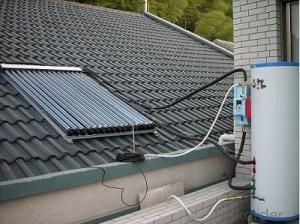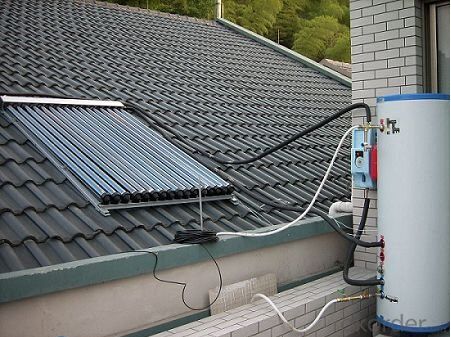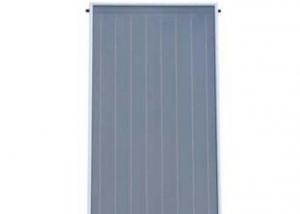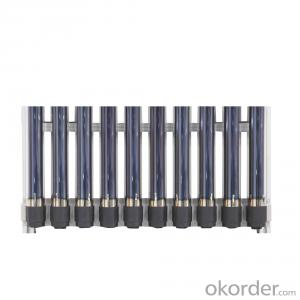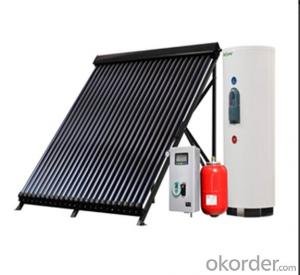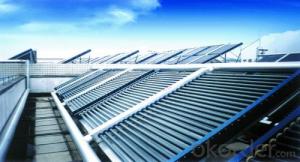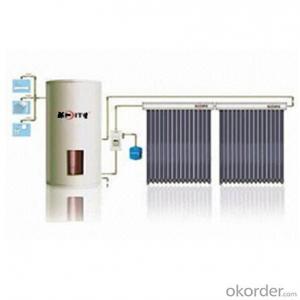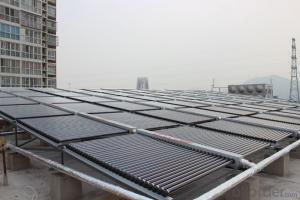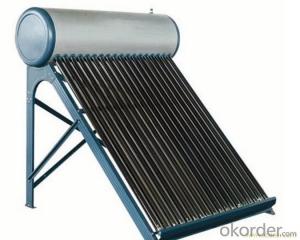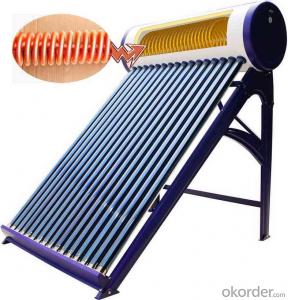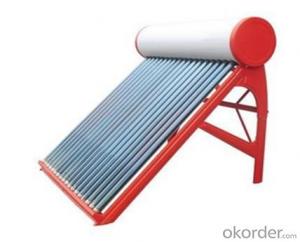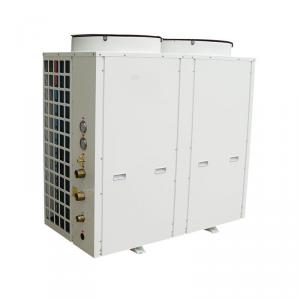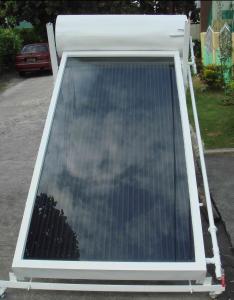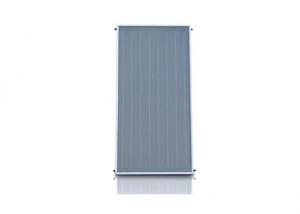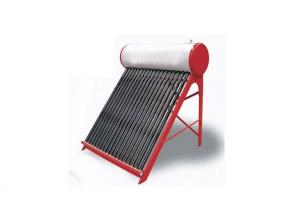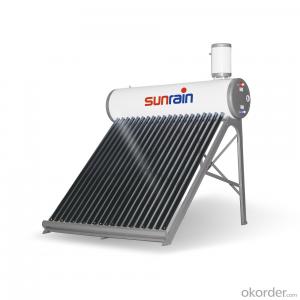Split Solar Water Heater for Pool with Two Copper Coils Inside Water Tank Model SS-M2
- Loading Port:
- Shanghai
- Payment Terms:
- TT OR LC
- Min Order Qty:
- 1 set
- Supply Capability:
- 2000 set/month
OKorder Service Pledge
OKorder Financial Service
You Might Also Like
1. Structure of Split Solar Heating System with Two Copper Coils inside Water Tank Model SS-M2
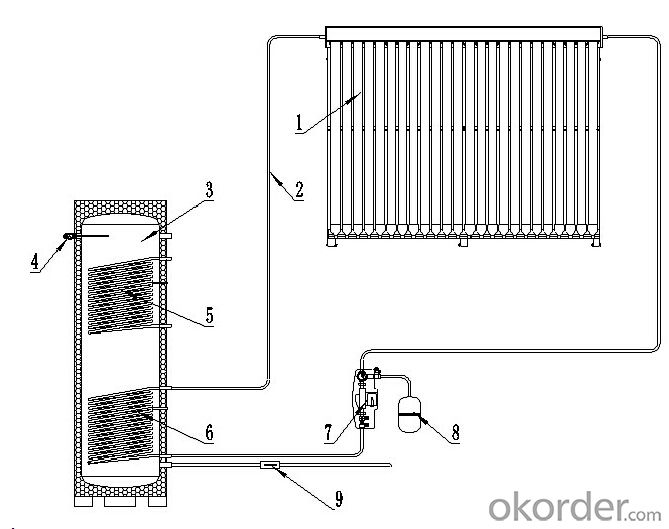
1 Flat Panel Collector;
2 Circulation Pipe;
3 Water Tank;
4 T/P Valve;
5 Upper Copper Coil;
6 Bottom Copper Coil;
7 Work Station;
8 Expansion Tank;
9 Check Valve
2. Main Features of Split Solar Heating System with Two Copper Coils inside Water Tank Model SS-M2
Food-grade stainless steel SUS304-2B inner tank
High heat transfer efficiency
Combined with auxiliary electricity, gas and other boiler
Easy installation according to the structure of the room
Integrated workstation,different Temperature cycle,make system efficient and help save energy
3. Split Solar Heating System with Two Copper Coils Inside of Water Tank Model SS-M2 Images
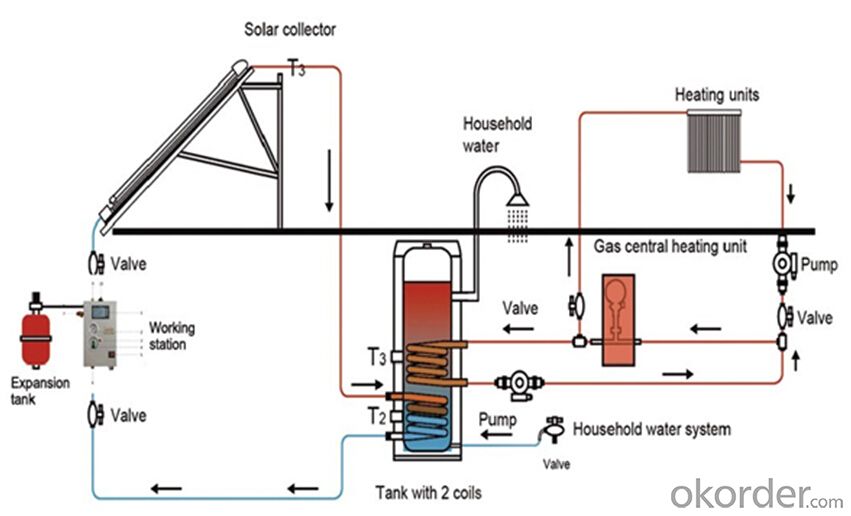
4. Split Solar Heating System with Two Copper Coils Inside Water Tank Model SS-M2 Specification
System model | SS-M2-150 | SS-M2-200 | SS-M2-250 | SS-M2-300 | SS-M2-400 | SS-M2-500 |
Tank capacity(L) | 150 | 200 | 250 | 300 | 450 | 500 |
Copper coil qty | 1/2 | 1/2 | 1/2 | 1/2 | 1/2 | 1/2 |
Solar collector model | SC-H-15/20 | SC-H-20/24 | SC-H-25/30 | SC-H-30/20 | SC-H-20/24 | SC-H-25/30 |
Solar collector qty | 1/1 | 1/1 | 1/2 | 1/2 | 2/2 | 2/2 |
Controller model | SR868C8 | SR868C8 | SR868C8 | SR868C8 | SR868C8 | SR868C8 |
Work station model | VSP-S1 | VSP-S1 | VSP-S1 | VSP-S1 | VSP-S2 | VSP-S2 |
Expansion tank spec | 12L | 12L | 18L | 18L | 24L | 24L |
Medium volume | 12L | 12L | 18L | 18L | 24L | 24L |
Recommended Flow | 1.0~2.0L/min | 1.2~2.5L/min | 1.5~3.0L/min | 3.0~5.0L/min | 4.0~7.0L/min | 5.0~8.0L/min |
Max temperature of tank | 95℃ | 95℃ | 95℃ | 95℃ | 95℃ | 95℃ |
Max temperature of system | 95℃ | 95℃ | 95℃ | 95℃ | 95℃ | 95℃ |
Rated pressure of the tank | 0.7MPa | 0.7MPa | 0.7MPa | 0.7MPa | 0.7MPa | 0.7MPa |
Media pre pressure | 0.2~0.3MPa | 0.2~0.3MPa | 0.2~0.3MPa | 0.2~0.3MPa | 0.2~0.3MPa | 0.2~0.3MPa |
Max pressure of system | 0.6MPa | 0.6MPa | 0.6MPa | 0.6MPa | 0.6MPa | 0.6MPa |
Voltage | AC220V 50Hz | AC220V 50Hz | AC220V 50Hz | AC220V 50Hz | AC220V 50Hz | AC220V 50Hz |
Recommended pipe diameter | φ15 | φ15 | φ15 | φ15 | φ22 | φ22 |
5. FAQ
Q1. Will water be heated on a cloudy day?
Re: Yes. Although the heat output of the solar collector is reduced on overcast days it will still be able to provide heat. If it is a heavily clouded day or raining, then more gas or electric boosting may be required to maintain water at the required temperature. This system will be automated so you don't have to worry about running out of hot water on a rainy day.
Q2. Can I use a solar collector with my existing hot water system?
Re: Normally yes. Simple retrofit valves can often be used to allow solar collector to connect to your existing cold water inlet. If your tank cannot accept the solar input directly, an additional storage tank can be installed to pre-heat the cold water prior to entering the existing tank.
- Q: Can a solar water heater be used in areas with limited access to nuclear power?
- Indeed, solar water heaters are a viable choice for regions hindered by limited nuclear power availability. By harnessing the power of the sun, these heaters efficiently warm water, negating the necessity for nuclear power or any external energy input. Their environmentally conscious and sustainable nature deems them fitting for usage in areas devoid of nuclear power accessibility. Furthermore, solar water heaters can be effortlessly incorporated into both residential and commercial structures, offering a dependable and economical substitute to conventional water heating techniques.
- Q: How does the cost of a solar water heater compare to traditional water heaters?
- The cost of a solar water heater is typically higher upfront compared to traditional water heaters. However, over time, solar water heaters can save significant amounts of money on energy bills, making them more cost-effective in the long run.
- Q: What is a passive solar water heater?
- A passive solar water heater is a system that uses the sun's energy to heat water without the need for additional mechanical or electrical components. It typically consists of a solar collector, storage tank, and pipes, where the sun's heat is absorbed by the collector and transferred to the water in the storage tank. This type of system is cost-effective, environmentally friendly, and relies on natural processes to provide hot water.
- Q: Can a solar water heater be used in areas with high levels of snowfall?
- Yes, a solar water heater can be used in areas with high levels of snowfall. However, it may require additional considerations and adaptations to ensure its optimal performance. Snow accumulation can obstruct sunlight, reducing the efficiency of the solar panels. Therefore, it is important to position the solar collectors at an angle that allows for the shedding of snow or install a system that automatically melts and removes snow. Additionally, insulating the pipes and water storage tank can help prevent freezing. Overall, with proper planning and maintenance, solar water heaters can still be effective in snowy areas.
- Q: What is the role of antifreeze in a solar water heater?
- To prevent the water inside a solar water heater from freezing in colder temperatures, antifreeze plays a vital role. The freezing point of the water is lowered by adding antifreeze, enabling it to continue circulating and transferring heat even in freezing conditions. This is crucial for the proper functioning of the solar water heater since freezing water can result in damage to the system, such as burst pipes or cracked components. Moreover, antifreeze also safeguards the solar collector and other parts of the system against corrosion and mineral buildup, which can harm its efficiency and lifespan. In summary, the presence of antifreeze in a solar water heater guarantees its reliable operation and longevity, even in cold weather.
- Q: Are there any health benefits associated with using a solar water heater?
- There are multiple health benefits associated with the use of solar water heaters. One of the main advantages is the decrease in exposure to harmful chemicals and toxins that are present in traditional water heating systems. Unlike traditional methods that rely on fossil fuels like natural gas or oil, solar water heaters utilize clean and renewable solar energy. This eliminates the release of harmful emissions during the heating process, resulting in improved indoor air quality and a reduced risk of respiratory problems. Furthermore, solar water heaters help prevent the growth of harmful bacteria and microorganisms in the water supply. Unlike traditional heaters that store hot water in tanks, which can create an environment suitable for the growth of Legionella bacteria and other pathogens, solar water heaters heat water on-demand. This minimizes the risk of bacterial contamination and decreases the chances of waterborne diseases. Additionally, the use of solar water heaters can positively impact skin health. Traditional water heating systems often rely on hard water, which contains high levels of minerals like calcium and magnesium. These minerals can dry out the skin and hair, leading to issues such as dryness, itchiness, and dandruff. However, solar water heaters can be equipped with water softening systems that remove these minerals. This results in softer and healthier skin and hair. Finally, the use of solar water heaters can contribute to overall mental and emotional well-being. By reducing reliance on non-renewable energy sources, individuals can feel a sense of satisfaction and pride in their contribution to a healthier and more sustainable environment. This positive mindset can have a cascading effect on mental health, improving mood, reducing stress, and promoting overall well-being. In conclusion, solar water heaters offer various health benefits, including reduced exposure to harmful chemicals, prevention of bacterial contamination, improved skin health, and positive impacts on mental well-being. By harnessing the power of the sun, solar water heaters provide a sustainable and health-conscious solution for water heating.
- Q: Can a solar water heater be used in areas with limited biofuel resources?
- Certainly, areas with limited biofuel resources can make use of a solar water heater. Unlike conventional water heaters that depend on biofuels like wood or coal, solar water heaters utilize the sun's energy to heat water. They employ solar panels or tubes to capture sunlight and convert it into heat energy, which is then utilized for water heating purposes. Given that solar energy is abundant and renewable, it obviates the need for any biofuel resources. Consequently, solar water heaters serve as an excellent substitute in regions where biofuel resources are scarce, offering a sustainable and eco-friendly solution to water heating.
- Q: Can a solar water heater be used with a hydronic heating system?
- Yes, a solar water heater can be used with a hydronic heating system. The solar water heater can provide hot water for the hydronic heating system, allowing it to operate efficiently and sustainably using renewable energy from the sun.
- Q: Can a solar water heater be used in areas with high levels of snow accumulation?
- Indeed, a solar water heater remains functional in regions where snow accumulates heavily; however, certain considerations must be taken into account. Firstly, the efficiency of solar panels in capturing sunlight decreases when covered in snow. Consequently, snow-covered panels generate less heat compared to clean ones. It is imperative to regularly maintain and clean the panels to ensure optimal performance. Secondly, the system should be designed to facilitate snow melt and drainage. Adjusting the angle and orientation of the panels can enhance snow shedding, while incorporating a slope in the installation guarantees the melted snow drains off the panels. Thirdly, insulating the pipes and storage tank is crucial to prevent freezing and heat loss during extremely cold temperatures. This ensures the system functions efficiently and provides hot water even in snowy conditions. Lastly, it is important to note that solar water heaters rely on sunlight absorption rather than just heat. Hence, in areas with substantial snow accumulation, as long as there is sufficient sunlight available, the solar water heater remains effective. Additionally, utilizing a backup heating system, such as an electric or gas heater, can supply hot water during extended periods of snow cover or low sunlight. In summary, while snow accumulation presents certain challenges, a properly designed, maintained, and insulated solar water heater can still be effectively utilized in regions with high levels of snow accumulation.
- Q: What is the impact of nearby bodies of water on the performance of a solar water heater?
- The presence of nearby bodies of water can have a positive impact on the performance of a solar water heater. The water acts as a heat sink, absorbing excess heat from the system and preventing it from overheating. This helps maintain optimal operating temperatures, improving the efficiency and longevity of the solar water heater. Additionally, the water can be used for various purposes such as preheating the incoming water supply, further enhancing the overall performance of the system.
Send your message to us
Split Solar Water Heater for Pool with Two Copper Coils Inside Water Tank Model SS-M2
- Loading Port:
- Shanghai
- Payment Terms:
- TT OR LC
- Min Order Qty:
- 1 set
- Supply Capability:
- 2000 set/month
OKorder Service Pledge
OKorder Financial Service
Similar products
Hot products
Hot Searches
Related keywords
